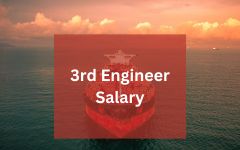3rd Engineer Duties and Responsibilities
Discussing with many third engineers who use Vesseljoin, the first social media platform for seafarers, we are going to give an overview of the third engineer duties and responsibilities.
As a third engineer onboard a ship, your role is an important one. You play a critical part in ensuring the vessel runs safely and efficiently, as well as helping to maintain and repair the ship's machinery. In this article, 3rd engineer duties and responsibilities, as a 3rd engineer onboard ship, will be examined.
Ship Machinery | Monitoring & Maintenance
3rd Engineer Duties and Responsibilities are obviously related to the ship's machinery. As a 3rd engineer onboard a ship, one of your key duties is to monitor and maintain the ship's machinery. This involves ensuring that all mechanical equipment is running correctly, including the main engine, auxiliary engines, generators, pumps, and other vital systems.
To perform this duty, you must be familiar with the ship's machinery and have a thorough understanding of the various components and systems that make up the engine room. This includes understanding how to perform routine maintenance tasks such as changing filters and lubricating components, as well as being able to troubleshoot and repair complex mechanical issues.
You will need to work closely with the other members of the engineering team to ensure that all machinery is operating efficiently and effectively. This may involve collaborating with the Chief Engineer and other senior officers to develop maintenance schedules, as well as working with junior engineers and mechanics to carry out repairs and maintenance tasks.
Additionally, you will need to be able to identify potential issues before they become major problems. This means performing regular inspections and tests to identify any signs of wear and tear, corrosion, or other damage to the ship's machinery. You must also be able to diagnose and troubleshoot any problems that do arise and develop effective solutions to minimize downtime and ensure the safe and efficient operation of the vessel.
As a third engineer, you will be expected to have a high level of technical knowledge and experience in mechanical engineering. You should be familiar with the latest technologies and industry standards, and be able to apply this knowledge to ensure that the ship's machinery is operating at peak efficiency.
3rd engineer duties and responsibilities include that you work well under pressure and you are able to respond quickly and effectively to any emergencies or unexpected issues that may arise. This requires good communication skills, as well as the ability to think creatively and problem-solve in a fast-paced and often challenging environment.
Managing Fuel and Lubricants
Fuel and lubricants is another important aspect when it comes to 3rd engineer duties and responsibilities.
As a 3rd engineer onboard a ship, you are responsible for managing the ship's fuel and lubricants. This is a crucial part of your duties and responsibilities, as it directly affects the ship's ability to operate effectively and efficiently.
To manage fuel and lubricants, you must have a deep understanding of the different types of fuels and lubricants used onboard, as well as their specific properties and characteristics. You must also be familiar with the various regulations and guidelines governing their use and disposal, as well as any environmental or safety concerns that may arise.
Your primary responsibilities in managing fuel and lubricants include monitoring the levels of fuel and oil onboard, calculating the amount of fuel needed for each voyage, and ensuring that the fuel and oil are stored safely and securely. You must also keep accurate records of fuel and oil consumption, as well as any transfers or spills that occur.
To carry out these responsibilities effectively, you will need to work closely with the Chief Engineer and other members of the engineering team, as well as the Captain and other senior officers. You must be able to communicate effectively and work collaboratively to ensure that the ship's fuel and lubricant needs are met and that all relevant regulations and guidelines are followed.
In addition to managing fuel and lubricants, you may also be responsible for other related tasks, such as managing waste disposal and ensuring that the ship's systems are optimized for fuel efficiency. You may need to perform regular tests and inspections to identify any potential issues or areas for improvement and develop solutions to minimize waste and improve efficiency.
To be effective in managing fuel and lubricants, you must have excellent attention to detail, strong analytical skills, and the ability to work effectively under pressure. You must also have a thorough understanding of the ship's fuel and lubricant systems, as well as the ability to troubleshoot and resolve any issues that arise.
Compliance with Regulations |3rd Engineer Duties & Responsibilities
A critical role is ensuring that the vessel complies with all relevant regulations and guidelines. This includes regulations and guidelines related to safety, pollution prevention, and other aspects of maritime operations.
To ensure compliance with regulations, you must be familiar with the various regulations and guidelines that apply to the ship and its operations. This includes regulations from the International Maritime Organization (IMO), as well as national and regional regulations that may apply.
You must also work closely with the Chief Engineer and other members of the engineering team to develop and implement policies and procedures that ensure compliance with these regulations. This may involve developing checklists and other tools to help identify potential areas of non-compliance, as well as developing training programs to help ensure that all crew members understand their responsibilities and obligations.
In addition to ensuring compliance with regulations, you must also be able to respond quickly and effectively to any incidents or emergencies that may arise. This includes responding to pollution incidents, engine room fires, and other situations that require immediate action.
To be effective in ensuring compliance with regulations, you must have excellent communication skills, as well as strong analytical and problem-solving abilities. You must be able to work effectively with other members of the crew and collaborate closely with other departments, including the deck department and the ship's officers.
You must also be able to stay up to date with the latest regulations and guidelines, as well as any changes or updates that may be introduced. This requires a commitment to ongoing learning and professional development, as well as a willingness to adapt and respond to changing circumstances.
Supervising & Training | 3rd Engineer Duties and Responsibilities
As a 3rd engineer onboard a ship, you are responsible for supervising and training junior engineers, who may include cadets and other trainees. This is an important part of your duties and responsibilities, as it ensures that the ship's engineering department has a strong and effective team that can perform its duties safely and efficiently.
To supervise and train junior engineers, you must be able to communicate effectively and work collaboratively with others. You must also have a deep understanding of the ship's engineering systems, as well as the various procedures and protocols that govern their operation.
3rd engineer duties and responsibilities in supervising or training junior engineers include assigning tasks and responsibilities, providing guidance and instruction, and monitoring performance and progress. You must also provide regular feedback and evaluation, as well as identifying any areas for improvement or development.
In addition to these responsibilities, you may also need to provide training and instruction on specialized equipment or systems, as well as developing training programs and materials to help junior engineers develop their skills and knowledge.
To be effective in supervising and training junior engineers, you must have excellent leadership and communication skills, as well as the ability to work effectively under pressure. You must also have a deep understanding of the ship's engineering systems, as well as a commitment to ongoing learning and professional development.
In addition, you must be able to adapt your approach to the needs and abilities of each individual junior engineer, providing personalized guidance and support as needed. This requires a strong ability to listen and observe, as well as a willingness to be flexible and adaptable in your approach.
Reports | 3rd Engineer Duties and Responsibilities
3rd engineer duties and responsibilities are crucial when it comes to ensuring compliance with regulations and guidelines. One of their primary responsibilities is generating reports that document the ship's operations and performance. These reports can include machinery logs, fuel consumption reports, and other technical reports that must be accurate, timely, and in compliance with applicable regulations.
Aside from generating reports, the 3rd engineer must also submit them to the relevant regulatory agencies, such as the ship's flag state or other national and international bodies. This requires effective communication skills, both written and verbal, as well as the ability to work collaboratively with other members of the engineering team and adapt to changing circumstances.
In addition to report generation and submission, the 3rd engineer may also be involved in investigations and other activities related to incidents or accidents that occur onboard the ship. This can involve gathering information and data, analyzing data, and developing recommendations or corrective actions to prevent similar incidents from occurring in the future.
Overall, 3rd engineer duties and responsibilities onboard a ship are vital to ensuring the safe and efficient operation of the vessel. Their ability to generate accurate reports, communicate effectively with stakeholders, and participate in incident investigations is critical to maintaining compliance with regulations and guidelines and preventing accidents or incidents from occurring.
Advise for 3rd Engineers
- Always prioritize safety: As a 3rd engineer, safety should be your top priority. This means following all safety procedures and protocols, identifying and addressing potential hazards, and communicating effectively with other members of the engineering team and other crew members to ensure that everyone is aware of potential risks and can take appropriate action to mitigate them.
- Stay organized: The engineering department of a ship can be a busy and complex environment, so it is important to stay organized and keep track of all tasks, responsibilities, and deadlines. This may involve developing a system for tracking and prioritizing tasks, using checklists or other tools to ensure that nothing is overlooked, and communicating regularly with other members of the team to stay up to date on any changes or updates.
- Maintain a positive attitude: Working onboard a ship can be challenging and demanding, so it is important to maintain a positive attitude and a willingness to work collaboratively with others. This can help build a strong team dynamic and ensure that everyone is able to work together effectively and efficiently.
- Seek ongoing learning and professional development: The maritime industry is constantly evolving, so it is important to seek ongoing learning and professional development opportunities to stay up to date with the latest trends, technologies, and regulations. This may involve taking courses or attending conferences, networking with other industry professionals, or seeking mentorship or guidance from more experienced engineers.
- Communicate effectively: Effective communication is critical for success as a 3rd engineer. This means listening actively, speaking clearly and concisely, and being able to adapt your communication style to different audiences and situations. It also means being able to communicate effectively across cultural and language barriers, as ships often have crew members from a wide range of backgrounds and nationalities.
Remember to prioritize safety, stay organized, maintain a positive attitude, seek ongoing learning and professional development opportunities, and communicate effectively with others.






